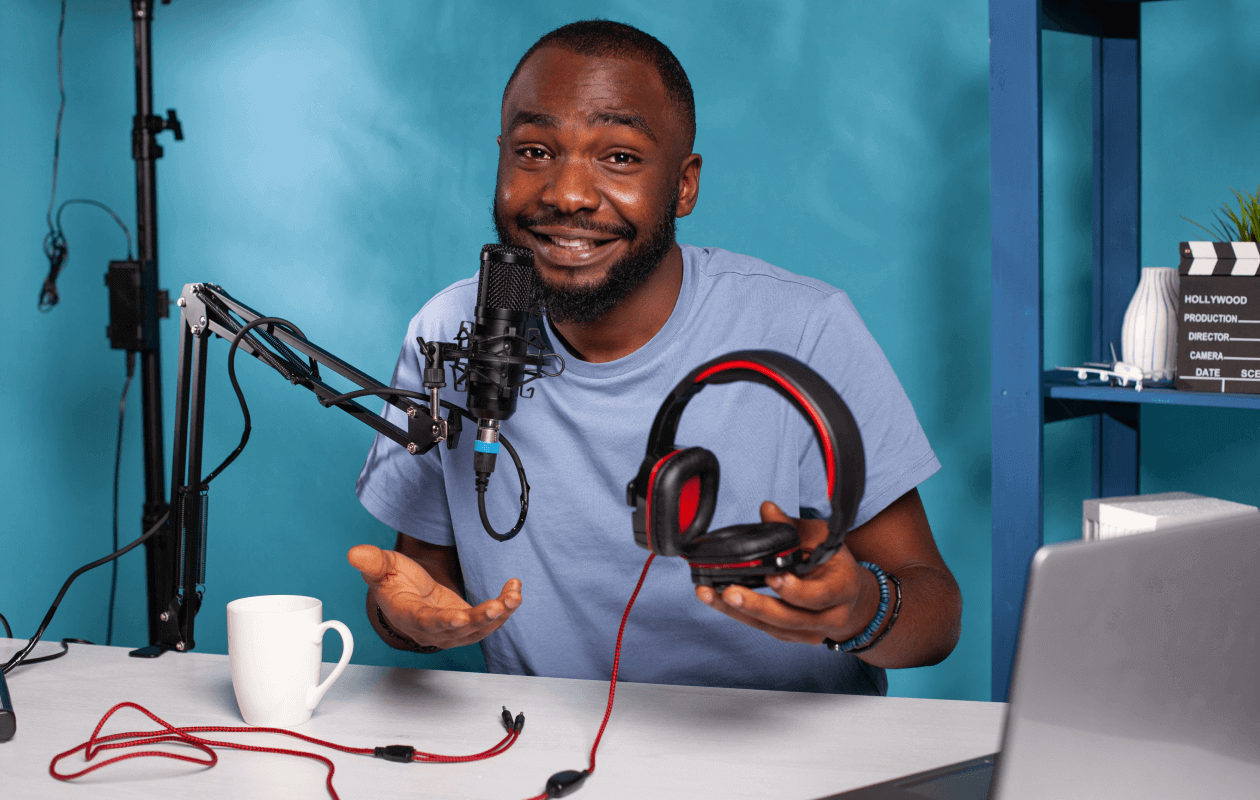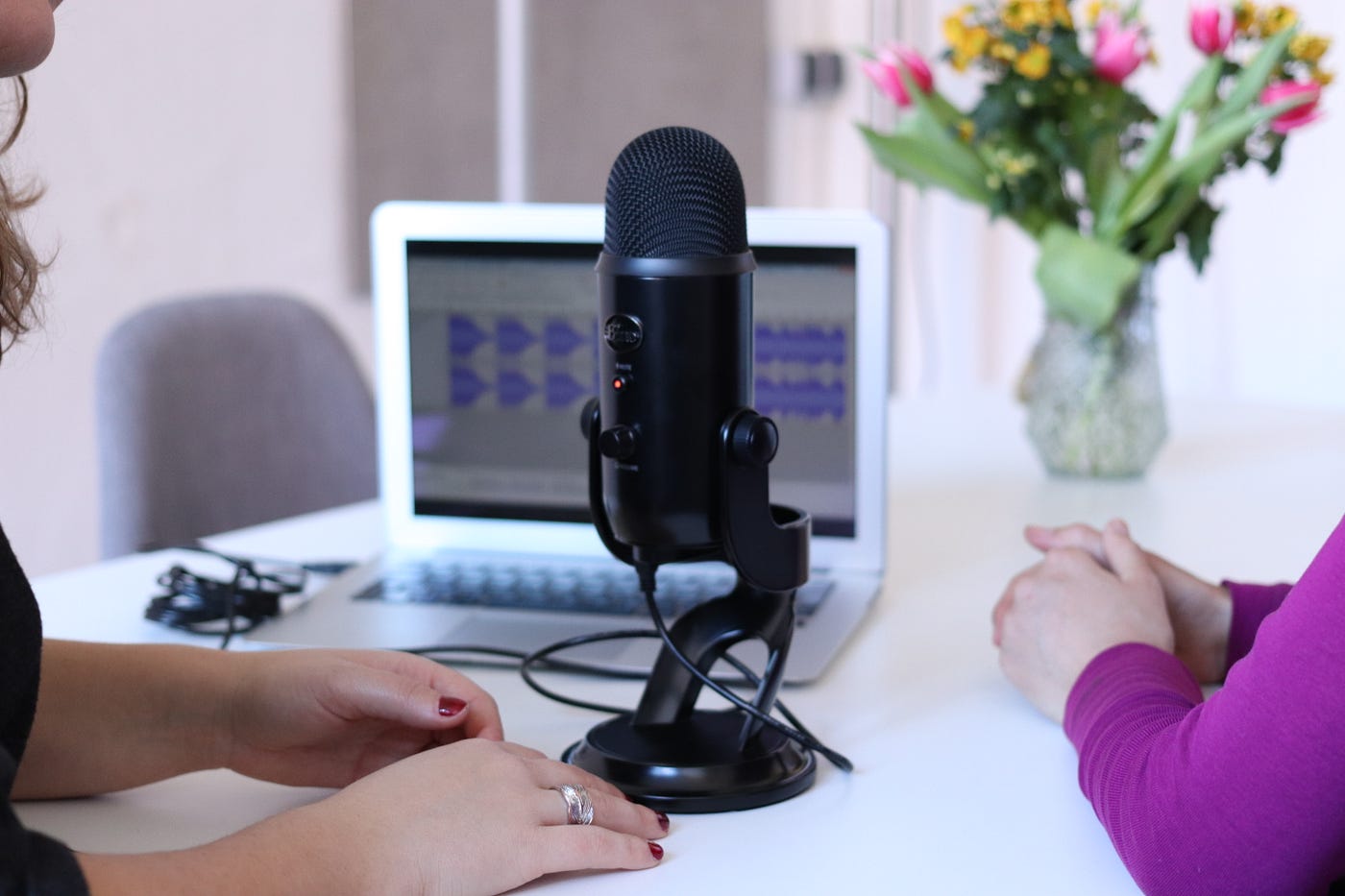Home>Events & Info>Podcast>What To Do While Listening To A Podcast


Podcast
What To Do While Listening To A Podcast
Modified: January 22, 2024
Discover engaging activities to enhance your podcast experience. Explore our useful guide on what to do while listening to a podcast and make the most of your leisure time.
(Many of the links in this article redirect to a specific reviewed product. Your purchase of these products through affiliate links helps to generate commission for AudioLover.com, at no extra cost. Learn more)
Table of Contents
Introduction
Podcasts have become increasingly popular in recent years, offering a convenient and immersive way to consume various forms of audio content. Whether it’s informative discussions, entertaining stories, or in-depth interviews, podcasts provide a unique platform for individuals to share their knowledge and experiences with a global audience.
While listening to a podcast, it’s important to make the most of your time and ensure a rewarding experience. Simply sitting back and passively absorbing the audio may not fully maximize the potential benefits that podcasts have to offer. Instead, actively engaging with the content can help you retain information, gain new insights, and even enhance your overall learning experience.
In this article, we will explore several strategies on what to do while listening to a podcast, ensuring that you are actively involved and getting the most out of your podcast listening sessions. From finding a comfortable space to taking notes, engaging with the content, and following up with additional research, we will provide you with practical tips and techniques to optimize your podcast listening experience.
So, whether you’re a podcast enthusiast or a newbie to the world of podcasting, let’s dive in and discover how to make your podcast listening sessions more interactive, educational, and enjoyable.
Find a Comfortable Space
One of the first steps to fully engage with a podcast is to find a comfortable space where you can listen without distractions. Choose a location where you can relax and focus solely on the audio content.
Whether it’s a cozy corner in your living room, a quiet park bench, or your favorite coffee shop, finding a space that allows you to unwind and concentrate is crucial. Make sure you have a comfortable chair or seating arrangement that supports good posture and minimizes discomfort during longer listening sessions.
Additionally, consider eliminating any potential interruptions or distractions. Turn off notifications on your phone or put it on silent mode to avoid interruptions. If you have roommates or family members, inform them of your intention to listen to a podcast and kindly request some uninterrupted time.
Creating a conducive environment for podcast listening not only enhances your focus but also helps in immersing yourself in the content and connecting with the ideas being discussed.
Remember, the goal is to create an atmosphere that allows you to fully embrace the podcast experience, so take the time to set up a space that promotes relaxation, concentration, and enjoyment.
Minimize Distractions
While finding a comfortable space is important, it’s equally crucial to minimize distractions that can disrupt your focus and detract from the podcast experience. Distractions can come in various forms, such as noise from the surroundings, visual distractions, or even mental distractions.
To minimize external distractions, consider using noise-canceling headphones. These headphones block out external sounds and create a more immersive listening experience, allowing you to fully engage with the podcast without being disturbed by background noise.
Avoid multitasking on tasks that require significant mental effort or concentration, as this can take away from your ability to absorb and understand the podcast content. For instance, avoid working on complex projects or tasks that demand your full attention while listening to a podcast. Instead, focus on simple, less demanding activities that can be done alongside listening, such as organizing your workspace, folding laundry, or engaging in light household chores.
Furthermore, minimize visual distractions by closing unnecessary tabs on your computer or putting your phone on airplane mode to resist the temptation of checking social media or responding to messages. Create a dedicated space where you can fully immerse yourself in the podcast without being visually stimulated by other digital distractions.
Avoiding mental distractions is equally important. Clear your mind and consciously set aside any stressful thoughts or worries before starting a podcast. Practice mindfulness techniques, such as deep breathing or meditation, to help calm your mind and improve your focus on the content.
By minimizing distractions, you create an optimal environment for actively engaging with the podcast, allowing you to fully absorb the information and get the most out of the experience.
Take Notes
One effective way to actively engage with a podcast is by taking notes. Jotting down key points, ideas, quotes, or questions while listening can help improve your retention of the information and promote deeper understanding.
When taking notes, be selective and focus on capturing the most meaningful and relevant information. Highlight important insights, interesting facts, or thought-provoking quotes that resonate with you. Write down any questions that arise during the podcast, as these can serve as valuable prompts for further exploration and reflection.
There are different methods you can use to take notes, depending on your personal preference and the content of the podcast. Some people prefer traditional pen and paper, while others opt for digital note-taking apps or even voice memos.
If you choose to use a digital method, consider using tools that allow you to organize your notes effectively. This could include creating separate headings or categories for different podcast topics, using bullet points or numbering to structure your notes, or using color-coding to differentiate between main points and supporting details.
Taking notes not only helps you retain information, but it also encourages active listening and engagement with the podcast. It keeps your mind focused on the content, and the act of summarizing and synthesizing the information in your own words helps solidify your understanding.
After listening to the podcast, take some time to review your notes. Reflect on what you’ve learned, consider any new perspectives, and think about how the podcast relates to your own experiences or interests.
By developing the habit of taking notes while listening to podcasts, you transform passive listening into an active learning experience, enabling you to extract the most value from each episode.
Engage with the Content
Engaging with the content of a podcast goes beyond just passively listening. It involves actively participating in the discussion, reflecting on the information, and forming your own opinions and insights. Here are some ways to truly engage with the content:
- Ask yourself questions: As you listen to the podcast, ask yourself questions about the topic being discussed. Challenge your assumptions, consider alternative viewpoints, and ponder how the information relates to your own experiences or interests.
- Visualize the concepts: Create mental images or visualizations of the concepts being discussed. This can help deepen your understanding and make the information more tangible and memorable.
- Relate it to real-life examples: Connect the podcast content to real-life examples or situations you have encountered. This helps you see the practical application of the information and reinforces your understanding.
- Pause and reflect: Take occasional breaks during the podcast to pause and reflect on what you have heard. Give yourself time to digest the information and think about how it resonates with you.
- Engage in critical thinking: Evaluate the arguments presented in the podcast critically. Analyze the evidence, consider counter-arguments, and form your own opinions based on rational thinking and careful evaluation.
Engaging with the content of a podcast enhances your active listening skills and allows you to derive more value from the information presented. By actively participating in the conversation, you encourage deeper learning, critical thinking, and personal growth.
If the podcast offers interactive elements, such as quizzes, polls, or listener submissions, take advantage of these opportunities to engage directly with the content and contribute to the ongoing dialogue.
Remember, the goal is not just to consume the podcast passively, but to actively engage with the ideas and concepts being discussed. By doing so, you can enrich your learning experience and get the most out of each podcast episode.
Multitask with Simple Tasks
One advantage of podcast listening is the flexibility it provides. Unlike other forms of media, podcasts allow you to multitask and accomplish other tasks while tuning in. While it’s important to find the right balance between focusing on the podcast and completing your tasks, simple or routine activities can be paired with podcast listening to make the most of your time.
For example, if you’re cleaning your house or doing chores, consider turning on a podcast to keep you entertained and engaged. This way, you can make the mundane tasks more enjoyable while also learning or being entertained by the podcast content.
Other simple tasks that can be paired with podcast listening include cooking, organizing your workspace, doing laundry, or going for a leisurely walk. These activities require a level of focus but can be done alongside listening to a podcast without compromising the quality of your engagement with either activity.
However, it’s important to note that some tasks may require more attention and concentration, such as writing an important email or working on a complex project. In these cases, it’s best to prioritize the task at hand and set aside dedicated time for focused work, without the distraction of a podcast.
Ultimately, multitasking with simple tasks and podcast listening provides a way to make the most of your time and turn routine activities into opportunities for learning and entertainment.
Remember to be mindful of the tasks you choose to multitask with and ensure that they are compatible with the audio content of the podcast. Select tasks that can be completed without interfering with your ability to actively engage with the podcast and absorb the information being presented.
By combining podcast listening with relatively simple tasks, you can optimize your productivity and make the most of your time while still enjoying the benefits of podcast content.
Physical Activities and Exercise
Pairing podcast listening with physical activities and exercise is an excellent way to optimize your time and make your workouts more enjoyable. Whether you prefer to go for a jog, hit the gym, or engage in home workouts, podcasts can provide the perfect audio companion to keep you motivated and entertained.
Listening to podcasts during physical activities provides a mental escape and serves as a distraction from any fatigue or monotony. Engaging with interesting conversations, stories, or educational content can help pass the time more quickly and make your workouts feel less strenuous.
Consider creating a dedicated workout playlist where you curate a selection of podcasts that align with your interests or fitness goals. Whether it’s a podcast about health and wellness, personal development, or even true crime, choose episodes that will keep you engaged and motivated throughout your exercise routine.
If you prefer outdoor activities like jogging or walking, podcasts can provide a welcome change from music or traditional audiobooks. They can stimulate your mind, expose you to new ideas, and entertain you during your outdoor workout sessions.
However, it’s important to find a balance between focusing on the podcast and maintaining the proper form and safety during physical activities. If you’re engaging in high-intensity exercises or activities that require your full attention, it may be better to save the podcast for lower-intensity workouts or cool-down sessions.
Remember to choose podcasts that have a tempo or tone that aligns with the pace of your workout. Upbeat and motivational podcasts can add an extra boost to your energy levels and help you push through challenging workouts. On the other hand, more conversational or introspective podcasts may be better suited for low-intensity or relaxing exercises.
By combining physical activities and exercise with podcast listening, you can turn your workout sessions into opportunities for personal growth, entertainment, and learning.
Reflect and Digest Information
After listening to a podcast episode, take some time to reflect and digest the information you have absorbed. This step is crucial for deepening your understanding, processing the content, and integrating it into your existing knowledge and perspective.
Start by giving yourself a few moments of quiet reflection. Think back on the key points, ideas, and concepts that resonated with you during the podcast. Consider how they relate to your personal experiences, beliefs, or aspirations. Reflect on any new insights or perspectives that the episode may have offered.
Journaling can be a helpful tool during this phase. Write down your thoughts, reactions, and reflections on the podcast episode. Consider any questions or curiosities that have arisen as a result of listening. Journaling allows you to distill and articulate your thoughts, enabling a deeper engagement with the ideas presented in the podcast.
Think about how the podcast content can be applied to your own life or work. Are there any actionable steps or changes you can make based on what you’ve learned? Reflect on how the episode may have challenged or expanded your existing knowledge and beliefs.
It’s also beneficial to discuss the podcast episode with others. Share your thoughts and insights with friends, colleagues, or online communities. Engaging in a dialogue about the podcast content can help you gain new perspectives and deepen your understanding further. Additionally, it can spark interesting conversations and expand your network of like-minded individuals.
Remember, the goal is not only to consume podcasts for entertainment or information but to actively engage with the content and allow it to impact your thinking and actions. Reflection and digestion are essential steps in this process, as they help solidify your understanding and enable personal growth.
By taking the time to reflect and digest the information from the podcast, you extract the maximum value from each episode and continue to reap the benefits long after you’ve finished listening.
Follow-Up with Additional Research
Podcasts can serve as valuable starting points for learning about a particular topic, but they often provide just a glimpse into the subject matter. To deepen your understanding and expand your knowledge further, it’s beneficial to follow up with additional research.
When a podcast episode sparks your interest, take note of any references, books, articles, or studies mentioned by the hosts or guests. These can serve as excellent resources for further exploration. Look up these references and delve deeper into the subject matter, absorbing different perspectives and gathering more in-depth information.
Online platforms such as websites, blogs, and scholarly articles can provide additional insights and context. Seek out reputable sources that provide expert opinions, research findings, or real-life stories related to the podcast topic. This further research allows you to broaden your understanding beyond what was discussed in the episode.
Engage with online communities or discussion forums dedicated to the podcast or the topic it covers. These communities often provide a wealth of knowledge, insights, and a platform for asking questions, sharing ideas, and engaging in meaningful conversations. Listening to a podcast can be the starting point for building connections with like-minded individuals who share your interests.
Consider exploring related podcast episodes or series that cover similar topics. This allows you to gain multiple perspectives and a more comprehensive understanding of the subject matter. You may discover new podcasts or episodes that provide different insights or dive deeper into specific aspects that intrigue you.
Remember to keep an open mind during your research and be critical of the sources you encounter. Verify the credibility of the information and seek out diverse viewpoints to gain a well-rounded understanding of the topic.
By following up with additional research, you take ownership of your learning journey and unlock the potential for continuous growth and development. The podcast serves as a stepping stone, igniting your curiosity and prompting you to explore further.
The additional research enriches your understanding, expands your knowledge base, and allows you to engage more actively in conversations and debates surrounding the topic.
Discuss and Share with Others
One of the most enjoyable aspects of listening to podcasts is the opportunity to share and discuss the content with others. Engaging in conversations about the podcast episodes you’ve listened to can deepen your understanding, provide new perspectives, and foster a sense of community with fellow listeners.
Find friends, colleagues, or online communities who share your interest in the podcast or the topic it covers. Initiate discussions, share your thoughts, and listen to the opinions and insights of others. This exchange of ideas can spark new thoughts and challenge your existing beliefs, enriching your overall understanding of the content.
Consider hosting or joining a book club-style gathering where you and others can discuss the podcast episodes in a structured and focused manner. Set aside dedicated time to share key takeaways, ask questions, and engage in thought-provoking conversations. This allows you to dive deeper into the content, explore different interpretations, and tap into the collective knowledge of the group.
Don’t be afraid to engage the podcast creators as well. Many podcast hosts and producers actively participate in discussions and engage with their audience through social media platforms, email, or dedicated forums. Reach out to them, ask questions, provide feedback, or simply share your thoughts on the episode. This direct interaction can enhance your podcast experience and deepen your connection with the content creators.
Furthermore, consider sharing your favorite podcast episodes or recommendations with others. Spread the word and introduce new people to the content you find valuable or entertaining. You never know who may also become passionate about the podcast and join in the conversation.
By discussing and sharing podcast episodes with others, you broaden your perspective, gain new insights, and forge connections with like-minded individuals. The collective wisdom and diverse viewpoints can enrich your podcast experience and create a sense of camaraderie within your community.
Remember, podcast listening doesn’t have to be a solitary experience. Embrace the opportunity to engage with others, foster meaningful discussions, and share the knowledge and enjoyment you gain from each episode.
Conclusion
Listening to podcasts is not just about passive consumption of audio content; it’s an opportunity for active engagement, learning, and personal growth. By following the strategies outlined in this article, you can make the most of your podcast listening experience and extract greater value from each episode.
Start by finding a comfortable space where you can fully immerse yourself in the podcast. Minimize distractions to enhance your focus and concentration. Take notes to reinforce your learning and capture important insights. Engage with the content by asking questions, visualizing concepts, and relating them to real-life examples.
While multitasking with simple tasks, strike a balance between staying engaged with the podcast and completing your tasks efficiently. Incorporate podcasts into your physical activities and workouts to make them more enjoyable and productive.
After listening to a podcast, take time to reflect and digest the information. Explore additional research to deepen your understanding and broaden your knowledge on the topic. Engage in discussions with others, sharing your thoughts and listening to different perspectives.
In conclusion, podcasts offer a wealth of information, entertainment, and inspiration. By actively engaging with the content, you can transform your podcast listening sessions into active learning experiences. Embrace the opportunity to expand your horizons, challenge your thinking, and connect with a community of fellow listeners.
So, the next time you tune into a podcast, remember to find your comfortable spot, minimize distractions, take notes, engage with the content, multitask with simple tasks, reflect on your learnings, conduct further research, and discuss and share with others. Happy podcast listening!











